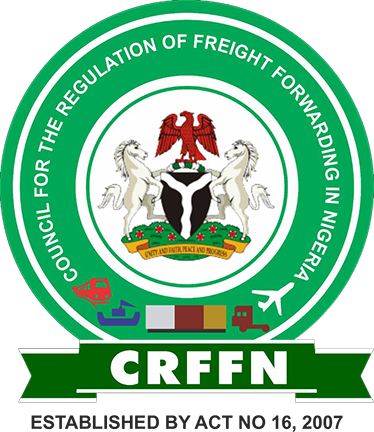
The appointment of Mr Kingsley Igwe as the Registrar and Chief Executive Officer of the Council for the Regulation of Freight Forwarding in Nigeria (CRFFN) comes at a pivotal moment. It also puts paid to several months of apprehension and anxieties about the future of the distraught government agency.
With his background as the former National Secretary of the National Association of Government Approved Freight Forwarders (NAGAFF), Mr Igwe is expected to bring considerable experience to his new office.
Coming after a long interface of an acting Registrar, the new helmsman at the CRRFN sure has enough on his table.
He must recognize the challenges and expectations that lie ahead. His mandate goes beyond merely managing the CRFFN; it requires him to reshape its image, unite its stakeholders, and drive systemic changes that will establish the Council as a stable and respected institution within Nigeria’s maritime sector.
One of the most critical tasks before Igwe is fostering unity among the different freight forwarding associations that make up the industry. With a background in NAGAFF, Igwe must make clear his commitment to fairness and impartiality from the outset. Although his connection to NAGAFF might allow him to understand particular nuances within the sector, it is essential for him to demonstrate an inclusive approach that respects and serves all associations equally, such as the Association of Nigerian Licensed Customs Agents (ANLCA), the National Council of Managing Directors of Licensed Customs Agents (NCMDLCA), and other associations with a stake in Nigeria’s logistics chain.
He must demonstrate impartiality and transparency, reassuring all associations that he will serve the interests of the sector as a whole. Any perception of favouritism toward NAGAFF or influence from so-called “godfathers” could heighten suspicion, undermine his credibility and deepen existing rifts.

The focus should be on establishing a balanced, collaborative regulatory framework where every association feels it has an equal seat at the table. Moreover, setting up cross-association committees focused on specific issues within the freight forwarding sector could promote deeper collaboration and reduce factionalism.
One of the steepest challenges Igwe faces is restoring the CRFFN’s reputation. The Council has long been regarded as one of the most problematic agencies under the Ministry of Marine and Blue Economy, with past leadership issues and management lapses that have hindered its effectiveness. Former Minister of Transportation; Rotimi Amaechi’s infamous comment describing the CRFFN as a “most troublesome” agency still lingers in the minds of many industry stakeholders. It is imperative for Igwe to take decisive action to reverse this reputation. To begin, he must address internal administrative weaknesses, streamline operations, and eliminate unnecessary bureaucratic obstacles that contribute to inefficiencies.
Improving professionalism within the Council should be a cornerstone of Igwe’s agenda. He must institute a rigorous standard for operational practices and professional conduct across all CRFFN departments, ensuring that each sector adheres to ethical standards. Furthermore, introducing training programmes aimed at boosting the professional skills of the Council’s staff will not only improve service delivery, but will also send a strong message about the CRFFN’s commitment to transformation. In the long term, Igwe should work towards establishing a code of conduct that encourages transparency and accountability in all interactions with freight forwarders, associations, and stakeholders.
Now that the CRFFN operates as a self-funded entity, Igwe faces the critical challenge of ensuring the agency’s financial stability without reliance on budgetary support from the Ministry. Transitioning to a self-sustained model represents both an opportunity and a potential pitfall; it allows the Council to operate independently of bureaucratic delays, but also requires financial ingenuity to maintain operational effectiveness.
Central to the CRFFN’s financial strategy will be the efficient collection of the Practitioner Operating Fee (POF). While the POF has traditionally been limited to the maritime industry, the Council must recognize that freight forwarding activities extend beyond this sector. Extending POF collections to include the aviation industry, where freight forwarding plays a substantial role, could significantly increase the CRFFN’s revenue stream. Ensuring that these fees are collected transparently and fairly will also be crucial in gaining the industry’s trust and cooperation. Igwe must focus on instituting rigorous auditing practices and creating a streamlined system for POF collection that minimizes loopholes and ensures accountability.
Beyond the POF, the Council should explore additional revenue streams, such as offering specialized training and certification programmes for freight forwarders, licensing consultancy services, and forming partnerships with local and international logistics bodies. These measures would diversify the Council’s income, reducing its dependency on a single source and positioning it for sustainable growth.
One of the strongest tools Igwe has at his disposal is stakeholder engagement. The freight forwarding sector is complex, involving numerous actors including shipping companies, customs agents, government regulatory bodies, and logistics firms. A Registrar who values and actively engages with these stakeholders can effectively lead the CRFFN in a direction that reflects the industry’s collective goals and needs. The good news is that, the new Registrar is from within the industry.
Creating a Stakeholder Advisory Council composed of representatives from all key associations and others could serve as a consultative platform to address issues ranging from policy issues and other issues. This advisory group would allow Igwe to gauge the sentiment of the industry and take informed decisions that enjoy broad support. Regular meetings, updates, and collaborative problem-solving sessions would establish a culture of transparency and open dialogue, fostering a sense of shared purpose. The proposed platform will enable this.
Effective communication with stakeholders would also position Igwe as a proactive leader willing to listen and act on industry concerns. For example, organizing quarterly forums and annual industry summits could serve as opportunities to review the Council’s progress, address emerging issues, and outline future objectives. Additionally, adopting digital platforms for transparent reporting and feedback mechanisms would ensure consistent and accessible communication with all stakeholders.
The CRFFN’s reputation as a poorly-managed and ineffective body has created a significant barrier to its success. Restoring the Council’s image will require the new Registrar to implement a thorough rebranding strategy focused on transparency, professionalism, and efficiency. A change in the Council’s public relations approach is essential. One approach to restoring public confidence in the CRFFN would be to highlight successful case studies where the Council has positively impacted freight forwarders, especially in areas like operational efficiency or policy reforms. Publicizing measurable successes and ongoing improvements would provide a counter-narrative to past criticisms. Additionally, by emphasizing ethical standards and regulatory compliance, Igwe can underscore the CRFFN’s commitment to integrity and professionalism, slowly shifting perceptions and building public trust.
Igwe’s predecessors had often struggled with navigating the internal complexities and political pressures within the CRFFN. Some have even seen their tenures prematurely cut short, due to mis-steps or controversies that exposed them to criticism and opposition. Igwe would do well to study the experiences of his predecessors to avoid similar pitfalls. Operating within the CRFFN requires diplomacy, strong ethical grounding, and a keen understanding of the political dynamics at play.
Avoiding political entanglements and focusing on serving the industry impartially will be critical for Igwe’s success. He must be wary of influences that could detract from his mission, including pressure from “godfathers” or other figures seeking to manipulate Council policies and decisions to their advantage. Ensuring that decisions are made transparently and based on objective criteria, rather than external influence, will shield him from much of the internal strife that has challenged past CRFFN leaders.
In an increasingly digital world, Igwe should also explore opportunities to incorporate technology to streamline CRFFN operations. By digitizing POF collections, freight forwarders’ registrations, and other administrative processes, the Council can enhance operational efficiency, reduce errors, and increase transparency. Implementing an online portal for real-time updates, document submissions, and feedback will save time for the Council and freight forwarders alike. Additionally, these technological advancements would allow the CRFFN to be more adaptable, positioning it for future growth and stability.
Kingsley Igwe has the unique opportunity to lead a transformative period for the CRFFN. A Registrar’s legacy is often defined not just by what they achieve, but by the vision they set for the future. By focusing on unity, professionalism, financial sustainability, stakeholder engagement, and innovative practices, Igwe can establish a blueprint for a modern, robust CRFFN that transcends the issues of the past.
The expectations for Kingsley Igwe’s tenure as Registrar of the CRFFN are high, but so are the stakes. In an industry characterized by complexity and competing interests, the path he takes can either reinforce existing tensions or pave the way for a more unified and resilient sector. By working diligently to promote fairness, stability, and collaboration, and by side-stepping the pitfalls that have hindered his predecessors, Igwe can create a foundation upon which the CRFFN can thrive. This is a moment for bold, visionary leadership and a chance to re-birth the CRFFN as a respected, effective regulatory body dedicated to supporting and advancing Nigeria’s freight forwarding sector.















